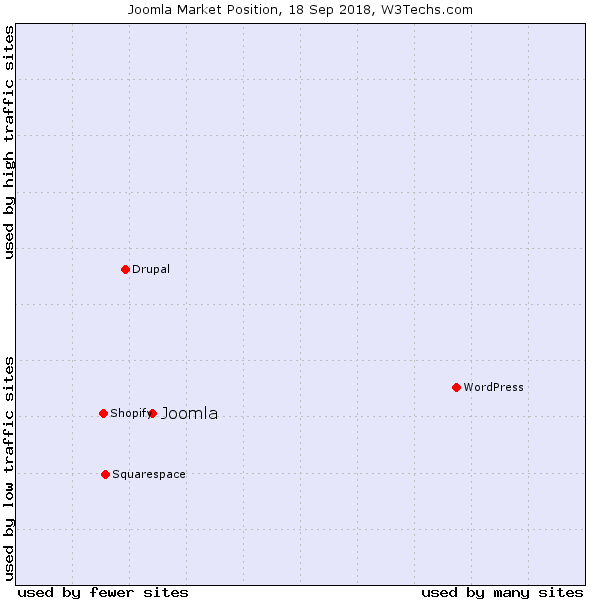
Chances are, when you think of building websites, WordPress almost immediately comes to mind. WordPress dominates with its market share and accessibility.
However, it’s not the only content management system (CMS) available. Drupal is a solid option with tons of functionality. But which is better? Take a look at Drupal versus WordPress and find out what’s the best open-source CMS!
Drupal vs. WordPress: Who Should Use Each?
WordPress and Drupal share similarities. Both are open-source content management systems with robust feature sets. However, the user base for each CMS differs. Anyone from a beginner seeking a no-frills blog to webmasters of highly trafficked, heavily customized websites should use WordPress.
Drupal, on the other hand, is better suited to users with some sort of development experience. Additionally, its high-performance, high-scalability nature means Drupal works best for enterprise websites rather than the average user.
- WordPress: Anyone from beginners to businesses.
- Drupal: Businesses and enterprise environment websites.
Drupal vs. WordPress: Ease of Use
My first ever blogging platform (excluding Blogger, which I try to forget) was WordPress. I began with a free WordPress.com blog before evolving to a self-hosted WordPress website. Most website hosting providers such as Bluehost and Hostgator offer simple one-click installations of WordPress to help you begin blogging in minutes. Even if you’re installing on your own hardware, it’s relatively uncomplicated.

Drupal, however, is decidedly more complex. While everyday use is manageable, installing Drupal isn’t as intuitive as WordPress. I’ve used both platforms, even installing WordPress and Drupal on devices such as a Raspberry Pi. Although WordPress installation went off without a hitch, Drupal required a bit of troubleshooting.
Even day to day use finds WordPress the easier platform. Its WYSIWYG editor provides loads of functionality. Overall, WordPress is more friendly to non-developers. Drupal isn’t terribly difficult, but the learning curve is greater.
Winner: WordPress
Drupal vs. WordPress: Community and Resources

Both WordPress and Drupal benefit from lively developer communities. As such, you’ll find tons of resources available from legitimate sources, including here on MakeUseOf’s programming section. Yet WordPress handily trounces Drupal. As the most used CMS, there’s a larger pool of resources. Over 75 million sites run on WordPress compared to about 1 million Drupal-based sites. Drupal remains the third most used CMS after Joomla, although Drupal is a better platform than Joomla.
Interestingly, a lower number of sites run on Drupal but it’s a CMS preferred by many high traffic sites. Among the more popular Drupal-based websites, League of Legends and Box.com use this open-source content management system. Boasting over 40,000 plugins and thousands of free themes, WordPress carries a greater number of resources. Drupal still features many popular plugins and themes, but it’s just less substantial than WordPress.
Winner: WordPress
Drupal vs. WordPress: Security
Drupal bests WordPress at security. Many enterprise websites, including NIH.gov use Drupal over WordPress. Since WordPress holds a much larger market share, it’s more vulnerable to cyber attacks. Plugins for WordPress do combat cyber-crime, but overall Drupal is a more secure platform. Coupled with regular monthly updates, Drupal wins out as a more secure CMS than WordPress.

With its enterprise-class security features and reports, it’s no surprise that Drupal is renowned among a smaller number of websites, but those with higher web traffic. For instance, whitehouse.gov operates on Drupal. Sucuri found that in 2016 the top three CMSes most affected by hacks were WordPress at 74%, followed by Joomla and Magento. Granted, with a market share around 60%, it’s natural that WordPress is far more hacked than Drupal.
That’s not to say WordPress is insecure. Rather, its prevalence makes it a primary cybercrime target. Moreover, the bevy of plugins for WordPress also open it up to vulnerabilities. If security is your main concern, opt for Drupal. Notably, this is a good choice for enterprise websites.
Winner: Drupal
Drupal vs. WordPress: Cost and Pricing
Thankfully, the cost of using WordPress and Drupal is free. Well, to start that is. Since both CMSes are open-source, you may download and install both at no cost. However, you’ll need hosting of some sort. WordPress.com is a free hosting platform, though a custom domain requires a paid upgrade.
Unfortunately, Drupal lacks a free hosting option. There’s no equivalent of WordPress.com for Drupal. Nevertheless, you can find pretty affordable hosting solutions and even run Drupal on your own hardware. As such, cost is pretty much a tie.
Winner: Tie
Drupal vs. WordPress: Flexibility
As adaptable as WordPress is, Drupal ultimately trounces it. You’ll find extreme customization options, from custom content types to permissions, and even features like multilingual capabilities included by default. Themes and plugins for WordPress do compensate somewhat, but it’s not enough to make up for the sheer adaptability of Drupal.
Yet there’s a cost. Unless you’re a developer, you’ll likely need to hire a developer when running a Drupal-based website. Even if you are a developer, chances are you’ll still want to hire a developer.
Winner: Drupal
Drupal vs. WordPress: Popularity

In a way, content management systems are like high school, since popularity does matter. WordPress obliterates the competition with a CMS market share at almost 60%. This translates to far more plugins, themes, communities, and resources. Sure, Drupal does have a loyal following which tends to be developer-oriented. Popularity shouldn’t matter, but it does, and WordPress isn’t even threatened by competing CMSes.
Winner: WordPress
Which Open-Source CMS Should You Use?
For the vast majority of users, WordPress is the best platform. It fits the needs of virtually every situation, from a solitary blogger to major content websites such as Mashable, and even e-commerce websites. Drupal is a more complex CMS with enhanced security. As such, it’s more common with government websites, and heavy hitters such as NBC.
Because of its wide adoption and the massive amount of resources available, from free plugins and themes to in-depth tutorials, WordPress is hands down the best open-source content management system. WordPress simplifies the process of using a CMS. Drupal essentially requires familiarity with development, as it’s a content management system by developers, for developers.
As a writer, the vast majority of the sites I’ve written for, including my own personal website, are WordPress-based. Drupal has its uses, and is an excellent open-source CMS. But WordPress is best for the vast majority of users.
Want to know more about WordPress? Learn how to become a WordPress professional in just a few simple steps!
Read the full article: Drupal vs. WordPress: What Is the Best Open-Source CMS?



